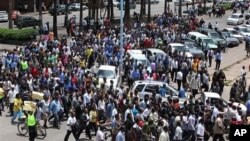Zimbabwe’s government and its employees are in salary negotiations for the first pay increases in two years. The employees have rejected a 24 percent pay increase.
Zimbabwe's government, the country's largest employer, is meeting with some civil service leaders for talks on wages. The increase in salaries and some allowances for civil servants would be the first since the inclusive government came to power in February 2009.
But the teachers’ representative to the talks, Tendai Chikowore, told journalists Tuesday in Harare she had little confidence the negotiations would achieve results. Teachers unions say they doubt they will be able to launch a successful strike as there are divisions among unions and teachers' associations.
The country has about 290,000 civil servants.
Several public-service sectors have said their members will launch a nationwide strike, but few believe this will happen as most union leaders say they know Zimbabwe has no more money to increase wages. The health and education ministers have said repeatedly they are in sympathy with teachers' and health workers’ low salaries, but they do not have much money to work with.
Defense Minister Emmerson Mnangagwa is also feeling the pinch of the cash budget. He told army personnel at a staff college Tuesday he would have to cut 15,000 jobs, bringing the army to 40,000.
Many civil rights activists have criticized the size of the army for a country not at war and which is not engaged in peace keeping work. Zimbabwe Lawyers for Human Rights said last week the national army is partisan and actively supports President Robert Mugabe's ZANU-PF party.
Zimbabwe operates on a cash basis and has no access to international loans.
Statistics from private sector organizations, such as the Chamber of Mines and Confederation of Zimbabwe Industries, say the country's economy is not expanding from the very low base inherited by the inclusive government from ZANU-PF.
Even though inflation has been tamed since Zimbabwe abandoned its currency and adopted the U.S. dollar and South African rand, there is almost no foreign investment. Retail trade has stabilized and even expanded, but economists and the Chamber of Commerce said most products in shops are now imported, mainly from South Africa.
Prime Minister Morgan Tsvangirai says Zimbabwe will struggle for investment until there is substantial legislative reform and political stability.
President Robert Mugabe blames Zimbabwe’s economic troubles on Western sanctions against himself and his colleagues in ZANU-PF and about a dozen mostly state-owned companies. The United States says the sanctions are intended to restore the rule of law to Zimbabwe.




